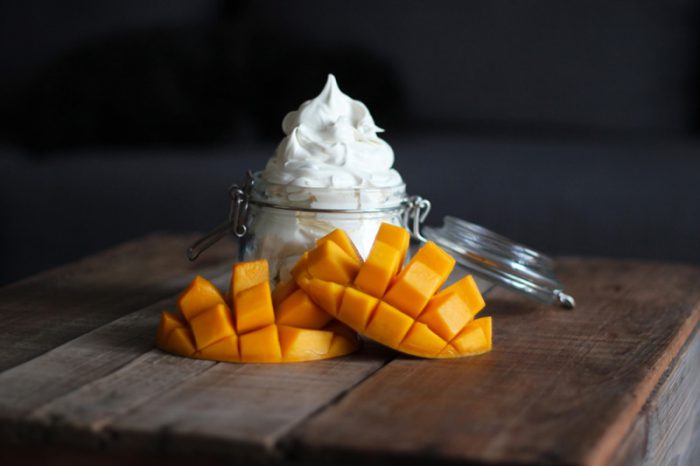Mango – an incredibly-smelling exotic fruit that is widely-known and eagerly used for cooking. Its seeds are considered as more valuable than the flesh because mango butter is obtained from the seeds in particular; and mango butter itself is an extremely precious cosmetic. What are the properties of mango butter and is it worth having it on our bathroom shelf?
Mango butter INCI: Mangifera Indica (Mango) Seed Butter
Mango butter is pressed form Hindu Mango seeds. It’s available in two versions: refined and non-refined. The second version is more valuable because refining process deprives the butter from most vitamins and essential nourishing substances. In the case of mango butter, it is very easy to recognise which version we are dealing with. To clarify, refined mango butter is colourless, whereas non-refined can be described as rather yellowish. Moreover, non-refined mango butter has delicate, pleasant and intensive fragrance contrary to the refined version that is fragrance-free.
Mango butter – composition
Butter extracted from beautifully-smelling mango is a source of mono-saturated fatty acids that belong to omega-9 group, but mostly, it’s a source of oleic acid which is perfect for treating medium porosity hair. The list of fatty acids doesn’t end here because mango butter also features saturated fatty acids (stearic acid and palmitic acid). Here is how the fatty acids percentage distribution in mango butter looks like:
- oleic acid – approx. 40-50%
- palmitic acid – approx. 5-8%
- stearic acid – approx. 22-48%
Apart from the above-mentioned fatty acids, mango butter is full of invaluable substances, especially in terms of hair and body care.
- phytosterols – positively influence the condition of skin and hair, stimulate collagen synthesis and slow down skin ageing processes;
- flavonoids – they are powerful anti-oxidants which counteract the damaging action delivered by free radicals to skin cells; they slow down body ageing, take care of skin and hair flexibility; flavonoids are able to reinforce weakened blood vessels, soothe inflammations and heal up acne;
- vitamin A – is responsible for maintaining the self-renewal processes of organism and slows down ageing, strengthens hair and prevents its brittleness; this vitamin also shields skin against oxidative stress;
- vitamin C – the most powerful anti-oxidant in the fight of suppleness and flexibility of skin and hair; it’s vitamin C in particular that takes care of proper hair growth and facilitates absorption of other vitamins and microelements;
- vitamin K – it takes care of scalp, reinforces hair bulbs and prevents hair loss;
- B-group vitamins (B1, B2, B12) – these vitamins are exceptionally valuable – our organism isn’t able to produce them on its own so they have to be constantly delivered to our body; the vitamins are responsible for appropriate hair growth, they ocus on skin and nails;
- polyphenol – combats free radicals, maintains cell division.
Mango butter – cosmetic properties
First of all, it’s a perfect agent to be used for skin moisturising. Basically, mango butter softens epidermis, copes with skin roughness and smooths it. Secondly, due to creating an occlusive layer on skin surface, mango butter prevents water loss. As a consequence, it restores hydro-lipid barrier and effectively regenerates skin.
It’s also worth mentioning that mango butter is easy to distribute on body and is frequently used for body massage, especially for massaging skin affected by stretch marks or irritations. The truth is, mango butter is able to reduce visibility of small scars and brings back pretty skin tone.
Many people report applying mango butter in order to regenerate chapped and rough heel skin; it can be applied to feet and left overnight (worth putting on cotton socks). Moreover, mango butter serves chapped lips, rough knees and elbows well, too. It is absorbed by skin very fast. Also, this natural cosmetic is often used to treat psoriasis, eczema and to slow down mature skin ageing processes.
Home treatments and DIY recipes with mango butter
Nourishing mango butter bath
Mix a spoon of the butter with a few drops of essential oil, add to bathwater (or pour into a bowl of water if you want to have mango foot bath). The butter will make skin softer and leave it smooth; the essential oil, in turn, will deliver aromatherapeutic action. If your body is affected with cellulite, go for some citric essential oil because it boosts skin tissue metabolism.
Mango butter scrub
Add brown sugar to the above-mentioned mixture (mango butter & essential oil) and combine all ingredients. You can apply the scrub to belly, thighs, feet, elbows and hands. Sadly, it is too rough for face skin. Massage selected body parts until the sugar melts completely.
Mango butter lip balm
Mix a spoon of mango butter with a half of spoon of cocoa butter and add a little bit of beeswax (it will help you mix both butters).
Mango butter – Comments
Mango butter wins positive comments especially as a cosmetic dealing with dry and rough skin. It smells wonderful and its price isn’t exorbitant. Its popularity is also achieved by its efficiency and easy application. It’s recommended by bloggers, vloggers and cosmetologists.


















Leave a Reply